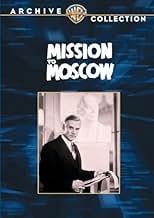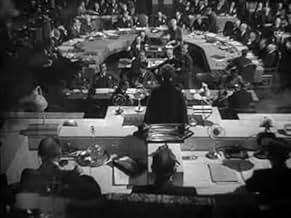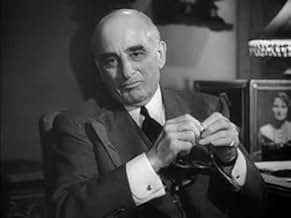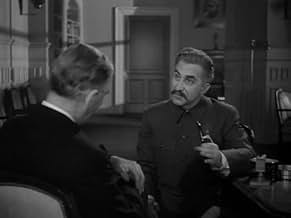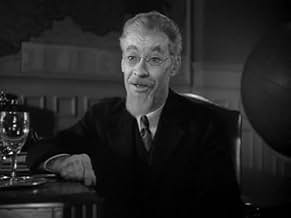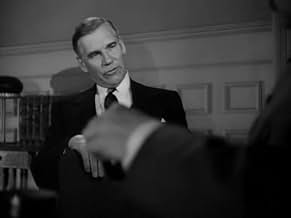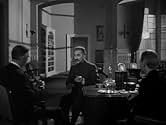IMDb रेटिंग
5.4/10
1.1 हज़ार
आपकी रेटिंग
अपनी भाषा में प्लॉट जोड़ेंAmbassador Joseph Davies is sent by FDR to Russia to learn about the Soviet system and returns to America as an advocate of Stalinism.Ambassador Joseph Davies is sent by FDR to Russia to learn about the Soviet system and returns to America as an advocate of Stalinism.Ambassador Joseph Davies is sent by FDR to Russia to learn about the Soviet system and returns to America as an advocate of Stalinism.
- 1 ऑस्कर के लिए नामांकित
- 2 जीत और कुल 1 नामांकन
फ़ीचर्ड समीक्षाएं
An odd little movie. "Mission to Moscow" was brought to my attention by a BBC documentary on Stalin in the war years "WWI Behind Closed Doors". It describes the intense diplomatic efforts made by the allies during WWII to bring the Soviet Union into the war against Germany. Leaders in the West were willing to cast a blind eye to Soviet brutality and repression, including the massacre of Polish military officers at Katyn and the establishment of puppet governments in the territories they controlled, in order to keep them on the side of the West. This effort involved swaying public opinion in Western countries, and Joseph Davies' "Mission to Moscow" was cited as an example of this effort. There is an excellent article on Davies in Wikipedia, which describes how keen he was to see only the positive in the Soviet Union. Ironies abound in this film. Molotov appears as a kindly old professorial gent, Stalin is a hopeful visionary yearning for world peace. The glimpses of daily life in the Soviet Union include ice skating parties with piles of food, high fashion for the ladies, English-speaking railroad workers with nothing but love for their country, and American expatriates expressing admiration for the inventiveness of the Russian hosts they are there to help. In fact, while Davies was ambassador, a large number of American expats were being imprisoned by Stalin as counter-revolutionaries, despite having voluntarily emigrated to the Soviet Union to contribute to building a new society. Many petitioned the US Embassy to have their passports restored, and Davies refused to intervene. At one point, the US embassy staff in Moscow threatened to resign en masse. When Stalin consolidated power with the purges of his former associates in 1936 ~ 1938, Davies attended several of the show trials, and in "Mission to Moscow" he is shown nodding knowingly when Bukharin and the other defendants "confess" to their anti-Soviet activities and conspiratorial association with the now arch-enemy Trotsky. In the movie, Davies repeatedly insists that his mission is to see the **real** Soviet Union first-hand, yet in his visits were said to have been highly scripted and organized by the Soviet authorities. In retrospect, Davies comes off as a naïve fool, but seen in the larger context, perhaps someone a little more competent would not have been able to supplied the West with the kind of pro-Soviet view Davies could supply.
But let's put history aside for a moment. This is just a bad film. It is stilted, over-scripted, and whatever points it is trying to make are spoon-fed to the audience. Davies had control over the final script, and his scenes come off as highly self-serving: Davies warning of the dangers of war over the objections of more experienced statesmen, Davies being congratulated at every turn by one world leader after the next for his insight into the coming war in Europe. You know pretty much at the beginning of each scene what is going to unfold – a vacation with the family to get away from world affairs ends with a phone call from the White House, a meeting with senators expressing doubt about the strength of Germany will end with Davies convincing them with facts to the contrary. And Walter Huston is just overworked here – he has to carry virtually every scene, because really, Mission to Moscow is mostly about Davies himself.
A just plain awful movie and yet fascinating to watch, especially for a glimpse into this brief period of time when the US actually tried to like Stalin, and fascinating also for the fantasy views of Soviet life in the late 1930s. And particularly worthwhile if you also take the time to research the persons and events portrayed in the movie and juxtapose these against the events portrayed in Mission to Moscow. It is a very educational experience.
At the time I saw this movie, it was not available on DVD, but could be downloaded from the Warner Brothers movie archive.
But let's put history aside for a moment. This is just a bad film. It is stilted, over-scripted, and whatever points it is trying to make are spoon-fed to the audience. Davies had control over the final script, and his scenes come off as highly self-serving: Davies warning of the dangers of war over the objections of more experienced statesmen, Davies being congratulated at every turn by one world leader after the next for his insight into the coming war in Europe. You know pretty much at the beginning of each scene what is going to unfold – a vacation with the family to get away from world affairs ends with a phone call from the White House, a meeting with senators expressing doubt about the strength of Germany will end with Davies convincing them with facts to the contrary. And Walter Huston is just overworked here – he has to carry virtually every scene, because really, Mission to Moscow is mostly about Davies himself.
A just plain awful movie and yet fascinating to watch, especially for a glimpse into this brief period of time when the US actually tried to like Stalin, and fascinating also for the fantasy views of Soviet life in the late 1930s. And particularly worthwhile if you also take the time to research the persons and events portrayed in the movie and juxtapose these against the events portrayed in Mission to Moscow. It is a very educational experience.
At the time I saw this movie, it was not available on DVD, but could be downloaded from the Warner Brothers movie archive.
Self-professed "capitalist" and businessman Joseph Davies is sent to Moscow by President FDR just prior to the outbreak of hostilities in Europe in 1939. His mission; assess the war-readiness of the Soviet people and the reliability of the Stalin regime as a potential ally.
What follows could be described as a "guided tour" of Soviet Russia, courtesy of the Kremlin. Davies embarks on a whirlwind inspection of Soviet farms, factories, schools and cities, all abuzz with the task of transforming a semi-feudal nation of serfs and peasants into a mighty world power. It is - as its critics claim - a heavy-handed glorification of the Soviet "workers" state under Stalin. At the same time, it is an early confirmation of what most recent historians have acknowledged; the Stalin regime, for all its flaws, was a popular regime with the Russian people with astounding achievements to its credit. Viewers, at any rate, can make up their own minds (a useful recent survey is *Stalinism as a Way of Life* - Yale U Press, 2000).
Walter Huston is effective as the droll, efficient Davies. Watch, too, for a plethora of uncredited "B" actors on screen for just a few seconds. Glenn Strange, Tom Tully and Kathleen Lockhart are familiar faces to fans of the thirties and forties and serve to jar us back to reality at critical points. The film is a useful antidote to the overwhelming and omnipotent anti-Sovietism of the Cold War, and should be taken as such.
What follows could be described as a "guided tour" of Soviet Russia, courtesy of the Kremlin. Davies embarks on a whirlwind inspection of Soviet farms, factories, schools and cities, all abuzz with the task of transforming a semi-feudal nation of serfs and peasants into a mighty world power. It is - as its critics claim - a heavy-handed glorification of the Soviet "workers" state under Stalin. At the same time, it is an early confirmation of what most recent historians have acknowledged; the Stalin regime, for all its flaws, was a popular regime with the Russian people with astounding achievements to its credit. Viewers, at any rate, can make up their own minds (a useful recent survey is *Stalinism as a Way of Life* - Yale U Press, 2000).
Walter Huston is effective as the droll, efficient Davies. Watch, too, for a plethora of uncredited "B" actors on screen for just a few seconds. Glenn Strange, Tom Tully and Kathleen Lockhart are familiar faces to fans of the thirties and forties and serve to jar us back to reality at critical points. The film is a useful antidote to the overwhelming and omnipotent anti-Sovietism of the Cold War, and should be taken as such.
This film was made to patronize Joeseph Stalin and warm USA audiences to American-Soviet relations. Warner boss Jack Warner called it the worst mistake of his career. Warner was a supporter of FDR and Roosevelt asked him to have this film made based on the 1941 book by former Ambassador to the USSR (1936-1938) Joseph E. Davies. Several films were made during this time to achieve the same effect like song of Russia, North Star and Counter Attack but this was a film for Stalin to see himself, hand delivered on a yet another mission to Moscow by Davies. This film portrays the brutal dictator Stalin as a fair and just man who has turned his backward country into a progressive industrial and agricultural giant that is moving toward democracy and desires peace and protection of it's borders. It mentions nothing of the one million deaths in the Soviet gulags that happened during Davies' ambassadorial tenure on his mission to Moscow. It glosses over the infamous purge show trials where Stalin rid himself of prominent party leaders where he had 50 of the 54 of the three trials executed under the guise of traitors who were conspiring with Germany and Japan to weaken the USSR. Stalin wanted absolute power but this film portrays these as fair and just trials. The costly Russo-Finnish War of 1939 is described by Davies as simply the Soviets wanting to annex Finland to protect Finland from the Nazi's. 23,000 Finns were killed and 43,000 wounded in this so-called effort to protect them. 127,000 Soviets were killed and 265,000 wounded. There is no mention of Stalin's man-made famine of the 1930's that resulted in the genocide of millions of Ukrainians. Stalin is portrayed as everybody's favorite uncle and FDR wanted Stalin to see how sympathetic we were to to him by having him actually view this film to maneuver a FDR-Stalin meeting in Alaska. FDR sent former Ambassador Davies on another mission to Moscow with this film and a message to Stalin from Roosevelt as to how much he respected him. Davies' successor in Moscow Ambassador William H. Standley was not in the loop on this mission and furious and resigned. Davies screened this film for Stalin. Stalin wasn't that impressed with the film or FDR's intentions and stalled on the Alaska summit. FDR was forced to send Secretary of State Cordell Hull to Moscow and Stalin agreed to a summit in Teheran instead of Alaska which would also include Winston Churchill who FDR didn't want for his proposed Alaska summit.
Michael Curtiz is the director and the film looks good from an artistic standpoint. Curtiz was best known for Casablanca and after starting out as an important European director in the teens and twenties he moved to Hollywood and became an important filmmaker. Howard Koch who wrote screenplays for such films as Casablanca adapted the Davies' book for the screen which later got him blacklisted from Hollywood. Bert Glendon who did such films as Hotel Imperial and The Ten Commandments in the 20's, Kidnapped and Young Mr. Linclon in the 30's and One Night in Lisbon and Our Town in the 40's is the film's cinematographer. This film was nominated for an Academy Award for Best Art Direction and stars FDR's favorite actor Walter Huston as Ambassador Davies. Also in the talented cast are Ann Harding, George Tobias, Oscar Homolka, Eleanor Parker, Gene Lockhart, Frank Faylen and Cyd Charisse. You can enjoy the documentary style approach to this film and the skills of it's renowned filmmakers and big studio production but you can't get past a propaganda film that glorifies the Stalin dictatorship. I would give it a 4.5 out of 10.
Michael Curtiz is the director and the film looks good from an artistic standpoint. Curtiz was best known for Casablanca and after starting out as an important European director in the teens and twenties he moved to Hollywood and became an important filmmaker. Howard Koch who wrote screenplays for such films as Casablanca adapted the Davies' book for the screen which later got him blacklisted from Hollywood. Bert Glendon who did such films as Hotel Imperial and The Ten Commandments in the 20's, Kidnapped and Young Mr. Linclon in the 30's and One Night in Lisbon and Our Town in the 40's is the film's cinematographer. This film was nominated for an Academy Award for Best Art Direction and stars FDR's favorite actor Walter Huston as Ambassador Davies. Also in the talented cast are Ann Harding, George Tobias, Oscar Homolka, Eleanor Parker, Gene Lockhart, Frank Faylen and Cyd Charisse. You can enjoy the documentary style approach to this film and the skills of it's renowned filmmakers and big studio production but you can't get past a propaganda film that glorifies the Stalin dictatorship. I would give it a 4.5 out of 10.
I can understand the need for pro-allied propaganda when the outcome of the war was still uncertain, but this was pathetic. It's no surprise that Howard Koch was the screenwriter for this rather sorry effort to promote Soviet propaganda, or that he was later cited by the HUAC. Propaganda can be fun - try North Star or Days of Glory. This movie is not an effort to raise morale or promote a cohesive war effort. It's purpose appears to try to justify any and all the barbaric atrocities committed during the Stalin regime. Example: The show trials were interspersed with remarks by allied journalists approving of the same judicial perversion for which we condemned Germany at Nueremburg. We agreed with the Soviet position that Trotsky was responsible for undermining the good works of the Soviet. We blame ourselves for the Russo-German alliance. The fact that Russia absorbed half of Poland in payment isn't discussed. This movie actually claims it was strategic move to buy time. Davies (Walter Huston) spends the entire movie trying to convince us that the Soviet Union performed a miracle, 5 yrs at a time. Big business is portrayed as greedy capitalists anxious to do business with Germany and Japan in pursuit of the Almighty buck. Russia invaded Finland as an act of self defense etc, etc. The examples are too numerous to mention.
Michael Curtiz' direction, as usual, is exciting and flawless. It is this movies' only saving grace. The early scene when Davies arrives at the Hamburg train station was precious. There are Swastikas everywhere. In typical Curtiz style, shadow troops marched passed the camera. Mein Kampf was for sale everywhere. Pathetic deportees are on the platform - number tags on their chest - waiting for transport to the camps. Hitler Youth marching like toy soldiers. If you can put the politics aside (I couldn't) you can really enjoy the visuals.
But beware, there was a message to this madness.
Michael Curtiz' direction, as usual, is exciting and flawless. It is this movies' only saving grace. The early scene when Davies arrives at the Hamburg train station was precious. There are Swastikas everywhere. In typical Curtiz style, shadow troops marched passed the camera. Mein Kampf was for sale everywhere. Pathetic deportees are on the platform - number tags on their chest - waiting for transport to the camps. Hitler Youth marching like toy soldiers. If you can put the politics aside (I couldn't) you can really enjoy the visuals.
But beware, there was a message to this madness.
This is one of the most astonishing films I've ever seen, not because of the content, but because of what it reveals about its subject. That would be one Joseph E. Davies, chosen by President Franklin Roosevelt before World War II as one of his personal ambassadors to the Soviet Union. FDR believed in the personal touch when dealing with other countries, so he would send his untrained cronies overseas for little fact-finding missions. Wendell Wilkie, for instance, went on one such mission at the height of the war. This film shows how well this tactic worked out.
This film records Davies' grand tour of Europe in the crucial 1937-1939 period. It opens with the real Davies giving a heartfelt (and very long) speech in which he describes himself as God-fearing and so forth (i.e., not a Communist). Then we segue to the actor playing Davies, Walter Huston, and follow his increasingly odd journey in which he talks to all the movers and shakers in Europe at the time (with the notable exception of Hitler, who refused to see him because he was "so busy," presumably planning his next invasion).
Now, this film was intended as a pure documentary of what Davies saw and learned. Davies himself obviously approved every single scene and every piece of dialog. That is what makes this film so astonishing.
Astonishing because Davies is revealed to be an absolute bumbler and inept fool who had no business touring Europe, much less representing the United States or having his opinions used to any purpose by the United States government. There are so many jaw-dropping moments that one almost begins to think this was a parody. But, alas, it was no parody, this is the actual sort of information that the US had about Europe on the eve of a war in which more than 20 million people died.
Davies laps up whatever fiction is served to him, and uses each morsel to regurgitate wrongheaded pronouncements about the state of the world. Virtually every conclusion he utters is based on information spoon-fed to him by people purposefully deceiving him. The truth about what was going on around him was discoverable, but he never bothers. As such, this film documents just how taken in Davies was by the Soviets, or put another way, how successful the Soviets were in snookering the naive American.
Let's give a few examples. Davies makes a big deal about "finding out" that Soviet factories were being sabotaged by opponents to Stalin (generically referred to as Trotskyites). Conveniently, these "saboteurs" were rounded up during his stay and put on trial. When some of his associates start questioning what is really going on, Davies piously opines, "We'd all just better wait for the trial so we can learn the real facts." Ha! Innocent abroad indeed. Indoctrinated in the US legal system, which was actually designed to get at the truth of a matter, Davies obviously had no idea what a Soviet show trial was all about. Obviously, as proved later, it was all an elaborate set-up. Soviet Marshal Mikhail Tukhachevsky had become too big for his britches, and Stalin wanted him dead, so he concocted the whole story about sabotage for Davies' (and everyone else's) benefit. Davies sits there, lapping up every lying word of it, unquestioning and practically inert intellectually.
At another moment, Davies' security people worry that their quarters may be bugged. They want to check the place out. But no, Davies will have none of it. "Let's give them the benefit of the doubt," he decides. One physically gasps when seeing this. Yes, this is the guy I want representing American interests abroad.
There are all sorts of propaganda moments that are delightful in their naiveté. The Soviets obviously put on a real show of their military might for the stupid American, with some particularly nice flourishes. A big deal is made in the film of the fact that there are women soldiers, women paratroopers, women this and that. This must have been to give an appearance of some kind of monolithic quality to Soviet forces. Yet students of the war will search in vain for the exploits of these hordes of Amazon warriors. It was all a show, kind of like those given at the Bolshoi. Hermann Goering bragged about doing the same thing to foreign visitors, it was a fairly common tactic among sophisticated diplomats. Somebody with a penetrating mind might have seen through such shenanigans, but that was asking too much of Davies.
Anyway, the film is such a farce that it's fascinating. Stalin looks so pleased with himself after feeding Davies more lies, lighting his pipe and smirking. Now we realize he wasn't happy because he had found such a fine fellow. Instead, he would have been smirking because he realized he had found the ultimate sucker. FDR himself caused the West endless grief at Yalta because he acted similarly to Davies, just "giving them the benefit of the doubt" and so forth. Stalin is said to have thought little of this film, and it is painfully clear why. He must have been embarrassed at the sheer ridiculousness of it, his choreographed charade immortalized on celluloid. It's possible that observing the sheer stupidity of the West may have contributed to his thinking he had more in common with the decidedly not-naive Hitler, leading to the Nazi-Soviet pact mentioned in the film (and explained away by Davies as Stalin just protecting his country, yeah, I'll buy that for $100, Alex).
Worth watching for a hoot, and to see how a reputation can be gutted by a person's own hand. I enjoyed it, but it also is agonizing seeing how much a fool it makes Davies look.
This film records Davies' grand tour of Europe in the crucial 1937-1939 period. It opens with the real Davies giving a heartfelt (and very long) speech in which he describes himself as God-fearing and so forth (i.e., not a Communist). Then we segue to the actor playing Davies, Walter Huston, and follow his increasingly odd journey in which he talks to all the movers and shakers in Europe at the time (with the notable exception of Hitler, who refused to see him because he was "so busy," presumably planning his next invasion).
Now, this film was intended as a pure documentary of what Davies saw and learned. Davies himself obviously approved every single scene and every piece of dialog. That is what makes this film so astonishing.
Astonishing because Davies is revealed to be an absolute bumbler and inept fool who had no business touring Europe, much less representing the United States or having his opinions used to any purpose by the United States government. There are so many jaw-dropping moments that one almost begins to think this was a parody. But, alas, it was no parody, this is the actual sort of information that the US had about Europe on the eve of a war in which more than 20 million people died.
Davies laps up whatever fiction is served to him, and uses each morsel to regurgitate wrongheaded pronouncements about the state of the world. Virtually every conclusion he utters is based on information spoon-fed to him by people purposefully deceiving him. The truth about what was going on around him was discoverable, but he never bothers. As such, this film documents just how taken in Davies was by the Soviets, or put another way, how successful the Soviets were in snookering the naive American.
Let's give a few examples. Davies makes a big deal about "finding out" that Soviet factories were being sabotaged by opponents to Stalin (generically referred to as Trotskyites). Conveniently, these "saboteurs" were rounded up during his stay and put on trial. When some of his associates start questioning what is really going on, Davies piously opines, "We'd all just better wait for the trial so we can learn the real facts." Ha! Innocent abroad indeed. Indoctrinated in the US legal system, which was actually designed to get at the truth of a matter, Davies obviously had no idea what a Soviet show trial was all about. Obviously, as proved later, it was all an elaborate set-up. Soviet Marshal Mikhail Tukhachevsky had become too big for his britches, and Stalin wanted him dead, so he concocted the whole story about sabotage for Davies' (and everyone else's) benefit. Davies sits there, lapping up every lying word of it, unquestioning and practically inert intellectually.
At another moment, Davies' security people worry that their quarters may be bugged. They want to check the place out. But no, Davies will have none of it. "Let's give them the benefit of the doubt," he decides. One physically gasps when seeing this. Yes, this is the guy I want representing American interests abroad.
There are all sorts of propaganda moments that are delightful in their naiveté. The Soviets obviously put on a real show of their military might for the stupid American, with some particularly nice flourishes. A big deal is made in the film of the fact that there are women soldiers, women paratroopers, women this and that. This must have been to give an appearance of some kind of monolithic quality to Soviet forces. Yet students of the war will search in vain for the exploits of these hordes of Amazon warriors. It was all a show, kind of like those given at the Bolshoi. Hermann Goering bragged about doing the same thing to foreign visitors, it was a fairly common tactic among sophisticated diplomats. Somebody with a penetrating mind might have seen through such shenanigans, but that was asking too much of Davies.
Anyway, the film is such a farce that it's fascinating. Stalin looks so pleased with himself after feeding Davies more lies, lighting his pipe and smirking. Now we realize he wasn't happy because he had found such a fine fellow. Instead, he would have been smirking because he realized he had found the ultimate sucker. FDR himself caused the West endless grief at Yalta because he acted similarly to Davies, just "giving them the benefit of the doubt" and so forth. Stalin is said to have thought little of this film, and it is painfully clear why. He must have been embarrassed at the sheer ridiculousness of it, his choreographed charade immortalized on celluloid. It's possible that observing the sheer stupidity of the West may have contributed to his thinking he had more in common with the decidedly not-naive Hitler, leading to the Nazi-Soviet pact mentioned in the film (and explained away by Davies as Stalin just protecting his country, yeah, I'll buy that for $100, Alex).
Worth watching for a hoot, and to see how a reputation can be gutted by a person's own hand. I enjoyed it, but it also is agonizing seeing how much a fool it makes Davies look.
क्या आपको पता है
- ट्रिवियाThis film was often mentioned during the 1947 House Un-American Activities Committee (HUAC) in its investigation of alleged Communist infiltration of the motion picture industry and was chiefly responsible for the blacklisting of screenwriter Howard Koch. Warner Bros. studio head Jack L. Warner defended the picture as being "made when our country was fighting for its existence, with Russia as one of our allies . . . The picture was made only to help a desperate war effort and not for posterity."
- गूफ़Aside from the issue of the fairness of the Moscow purge trials, or the truthfulness of the alleged confessions of the accused, the people shown standing trial together in the film in fact did not all stand trial at the same time. There were two such major show trials, one in 1937, the second in 1938, and the real life characters depicted in the film as being tried simultaneously were actually tried in separate groups at one of the two trials.
- भाव
Ambassador Joseph E. Davies: Mr. Stalin, I believe history will record you as a great builder for the benefit of mankind.
- क्रेज़ी क्रेडिटOpens with a card reading: We have the honor to present the former Ambassador from the United States to the Soviet Union, the Honorable Joseph E. Davies, who will address you prior to the showing of the film made from his important book, "Mission to Moscow". In the picture itself, Mr. Walter Huston portrays Mr. Davies during those vital years encompassed in his now significant report to this nation. And now, Mr. Davies: [Mr. Davies gives a presentation on the actual events leading up to these events, and to this film.]
- कनेक्शनFeatured in Hollywood on Trial (1976)
- साउंडट्रैकAmerica
(uncredited)
aka "My Country 'tis of Thee"
Music from "God Save the King"
Traditional
[In the score when Woodrow Wilson's bust is shown]
टॉप पसंद
रेटिंग देने के लिए साइन-इन करें और वैयक्तिकृत सुझावों के लिए वॉचलिस्ट करें
- How long is Mission to Moscow?Alexa द्वारा संचालित
विवरण
- रिलीज़ की तारीख़
- कंट्री ऑफ़ ओरिजिन
- भाषाएं
- इस रूप में भी जाना जाता है
- På uppdrag i Moskva
- फ़िल्माने की जगहें
- Lake Arrowhead, San Bernardino National Forest, कैलिफोर्निया, संयुक्त राज्य अमेरिका(Lake that Joe and family set off in a dingy named after his wife Marjorie)
- उत्पादन कंपनी
- IMDbPro पर और कंपनी क्रेडिट देखें
बॉक्स ऑफ़िस
- बजट
- $15,16,000(अनुमानित)
- चलने की अवधि2 घंटे 4 मिनट
- रंग
- पक्ष अनुपात
- 1.37 : 1
इस पेज में योगदान दें
किसी बदलाव का सुझाव दें या अनुपलब्ध कॉन्टेंट जोड़ें

